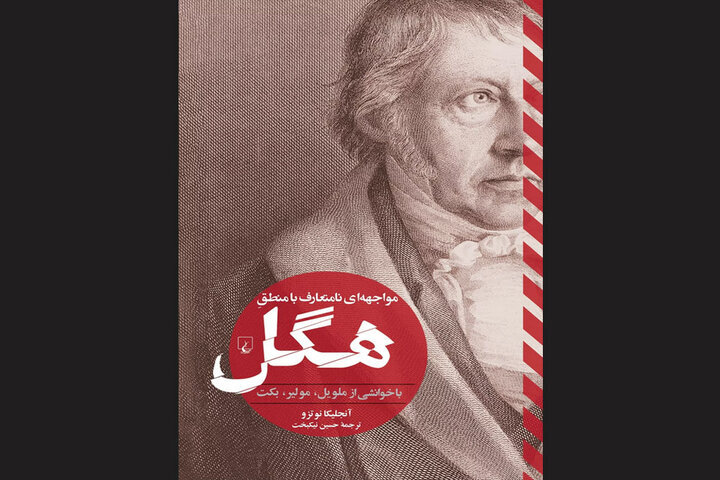“Approaching Hegel's Logic” published in Persian

TEHRAN-The Persian translation of the book “Approaching Hegel's Logic, Obliquely: Melville, Moliere, Beckett” written by Angelica Nuzzo has hit the Iranian bookstores.
Qoqnoos Publishing House has published the book in 664 pages with a translation by Hossein Nikbakht, Mehr reported.
In the book, originally published in 2018, Nuzzo proposes a reading of Hegel's Logic as “logic of transformation” and “logic of action,” and supports this thesis by looking to works of literature and history as exemplary of Hegel's argument and method.
By examining Melville's “Billy Budd,” Molière's “Tartuffe,” Beckett's “Endgame,” Elizabeth Bishop's and Giacomo Leopardi's late poetry along with “Thucydides' History” in this way, Nuzzo finds an unprecedented and productive way to render Hegel's Logic alive and engaging.
She argues that Melville's “Billy Budd” is the most successful embodiment of the abstract movement of thinking presented in Hegel's Logic, connecting Billy Budd's stutter to the puzzlingly inarticulate beginning of Hegel's Logic, “Being, Pure Being,” identical with “Nothing,” and argues that the Logic serves as an especially appropriate tool for understanding the sudden violent action that strikes Claggart dead.
Through these and other readings, Nuzzo finds a fresh way to address interpretive issues that have remained unresolved for almost two centuries in Hegel's scholarship and also presents well-known works of literature in an entirely new light.
This account of Hegel's Logic is framed by the need for an interpretive tool able to orient the readers’ understanding of the contemporary world as mired in an unprecedented global crisis.
Angelica Nuzzo is a professor of philosophy at the Graduate Center and Brooklyn College, City University of New York. She is the author of “Memory, History, Justice in Hegel” and the editor of “Hegel on Religion and Politics.”
Georg Wilhelm Friedrich Hegel (1770-1831) was a German philosopher and one of the most influential figures of German idealism and 19th-century philosophy. His influence extends across the entire range of contemporary philosophical topics, from metaphysical issues in epistemology and ontology to political philosophy, the philosophy of history, philosophy of art, philosophy of religion, and the history of philosophy.
Born in Stuttgart, Roman Empire, during the transitional period between the Enlightenment and the Romantic movement in the Germanic regions of Europe, Hegel lived through and was influenced by the French Revolution and the Napoleonic wars. His fame rests chiefly upon “The Phenomenology of Spirit,” “The Science of Logic,” his teleological account of history, and his lectures at the University of Berlin on topics from his “Encyclopedia of the Philosophical Sciences”.
Throughout his work, Hegel strove to address and correct the problematic dualisms of modern philosophy, Kantian and otherwise, typically by drawing upon the resources of ancient philosophy, particularly Aristotle.
Hegel everywhere insists that reason and freedom are historical achievements, not natural givens. His dialectical-speculative procedure is grounded in the principle of immanence, that is, in assessing claims always according to their own internal criteria. Taking skepticism seriously, he contends that people cannot presume any truths that have not passed the test of experience.
Hegel presents free self-determination as the essence of humankind – a conclusion from his 1806–07 “Phenomenology” that he claims is further verified by the systematic account of the interdependence of logic, nature, and spirit in his later “Encyclopedia”.
He asserts that the Logic at once preserves and overcomes the dualisms of the material and the mental – that is, it accounts for both the continuity and difference marking the domains of nature and culture – as a metaphysically necessary and coherent “identity of identity and non-identity”.
SS/
Leave a Comment